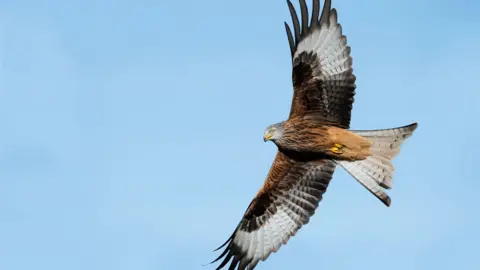Red kite poisonings in south west Scotland investigated
 Getty Images
Getty ImagesA police investigation has started following the discovery of three dead red kites in Dumfries and Galloway.
Tests have confirmed that two of the birds were illegally poisoned with examinations ongoing on the third.
It takes the number of birds killed by illegal pesticides in the region since the start of the year to four.
Police said the use of poisoned bait was "illegal and totally unacceptable" and could have "devastating consequences" for wildlife.
The incidents in the region since the start of the year are:
- a red kite discovered poisoned in Kirkpatrick Durham in January
- a buzzard found dead in Mossdale in March
- a second red kite killed at a separate location in Kirkpatrick Durham in April
- another red kite poisoned in April at Old Bridge of Urr
- a further red kite death with the cause yet to be established at Gelston in April
Specialist Wildlife Crime Officer PC Alan Steel said police were working closely with SAC Consulting and Science and Advice for Scottish Agriculture (SASA) to investigate the cases.
"What we have established is that illegal pesticides have been used to kill four of the birds," he said.
"The pesticides identified have been banned in the UK for many years, but despite this there would still appear to be those who leave out poisoned bait, whether that is to target crows, foxes, raptors or other wildlife.
"The use of such poisoned bait is illegal and totally unacceptable and those responsible should understand that their unlawful activities not only serve to have devastating consequences on their intended targets but also on various other forms of wildlife."
Land searches
He said they were "absolutely determined" to put a stop to the killings and find the people responsible.
They are working with a number of landowners and farmers and liaising with RSPB Scotland as part of the investigation.
"We have also carried out a number of land searches in the vicinity of where the birds have been located with a view of trying to locate poisoned bait at these locations," he added.
"It is anticipated that further land searches will take place in the near future."
A red kite trail in the region is reckoned to be worth millions of pounds to the local economy.
A study last year said the Galloway Kite Trail had generated more than £8.2m since it was launched in 2003.
